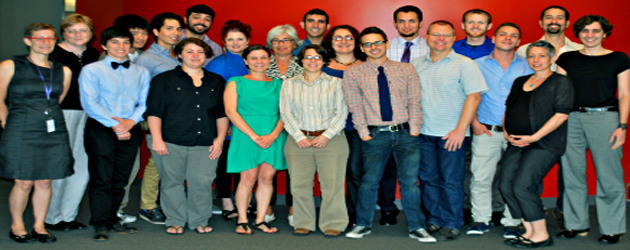
Front from left:
Aimee Van Wagenen (instructor), Janelle Downing, Julia Puckett, Sara Miller, Erin Singer, Christopher Wheldon, Paul Gilbert, Christiano Scandurra, Kerith Conron (instructor), Allegra Gordon
Back from left: Maria Brown, Cheng-Shi Shiu, Rodrigo Aguayo Romero, Brian Rood, Kristen Porter, Judith Bradford (instructor), Gabriel Galindo, Judy Margo, Steve Garcia, Ryan Watson, Manuel Ocasio
Photo courtesy of Fenway Health
By: Brook Rosini/Special to The Rainbow Times–
The 2012 Summer Institute in LGBT Population Health just wrapped up last month. A growing program offered by Fenway Health in partnership with Boston University and the University of Michigan, the Summer Institute provides participants with the tools they need to conduct population research in sexual and gender minority health. The Rainbow Times, TRT, interviewed Aimee Van Wagenen, Associate Research Scientist at the Fenway Institute, who explains the value of the program for LGBT communities around the world.
The Rainbow Times: How and when did the Summer Institute first get started?
Aimee Van Wagenen: We held the first Summer Institute in July and August of 2010. A training grant award from the Eunice Kennedy Shriver National Institute of Child Health and Human Development (NICHD) within the National Institutes of Health provided us with the resources to get the program going. We applied for the grant in 2009, in partnership with the Boston University School of Public Health and the University of Michigan, each of which is crucial to the program’s success. As our local academic partner, BUSPH provides classroom, data lab, and housing space for the program, and its faculty is among the key group of academic LGBT researchers who provide leadership on the program’s Curriculum Committee. The University of Michigan provides expertise in quantitative data analysis instruction through its renowned Summer Program in Statistics. The Summer Institute is a natural extension of Fenway’s work, which has long involved students and volunteers across the organization.
Q. Why was the program started?
A. The program stemmed from The Fenway Institute’s Center for Population Research in LGBT Health (www.lgbtpopcenter.org). The Center’s mission is to support the continued growth of research scholarship on sexual and gender minority health. The Center works toward that mission in several ways, including by offering training opportunities to support the work and development of the next generation of LGBT health researchers.
The program was designed as a response to a persistent challenge that plagues the field of LGBT health research – there is a paucity of formal training opportunities in this area for up and coming scholars. There are only a small handful of universities in the country that offer a course in LGBT health research. At many universities, there are few (if any) faculty members with research interest or expertise in sexual and gender minority populations. Many students who approach us are desperately seeking opportunities for formal learning in this area. They paint a picture of a tiring, uphill, and lonely battle to convince their mentors at their home institutions of the importance of LGBT health. Those who can convince their mentors that it is a worthwhile subject are faced with the daunting task of learning about the field on their own.
An important goal of the program is to expose people interested in studying LGBT health to rigorous methodological tools for studying sexual and gender minorities. We hope our training programs serve as a lever to increase the strength and quality of research in LGBT health. In the Summer Institute, we emphasize quantitative research methods and population science perspectives and our trainees get hands-on training in working with large-scale quantitative data sets. We hope in the future to do more in our training programs with other types of methodologies, including qualitative research and community-based participatory research.
Q. What is it about this program that draws researchers from all over the globe?

Aimee Van Wagenen (left) and Judith Bradford (right) presenting Rodrigo Aguayo Romero (center) with a certificate of completion of the program on August 10, 2012.
Photo courtesy of Fenway Health
A. Since 2010, we have received inquiries about the program from students studying in universities in 15 different countries. Some of these are countries you might expect—Canada, the UK, Italy, and France. Others are from much less expected locations like Cameroon, Malaysia, Tajikistan, and Zimbabwe. We get interest from all over the world for two reasons: 1) LGBT people are part of all societies and countries, in every corner of the globe, and 2) there are few formal training opportunities to study LGBT health anywhere in the world. All this interest has indicated that we need to do more to train international students, and we hope to build additional training programs specifically designed for international audiences in the future. Our current program can accommodate international students, but due to the restrictions of our NIH grant, cannot provide any direct support to them.
Q. How do individuals join the program?
A. The trainees who participate in the program are a diverse, interdisciplinary group selected in a competitive application process. Applications for the 2013 program will be due in mid-April of 2013, with selections made in early May. The call for applications will be released in Fall 2012 at www.lgbtpopcenter.org/training.
The grant that supports the program allows us to offer the program at no tuition to accepted participants. We also are able to provide scholarships that cover the cost of housing for trainees who are US citizens and attend the program from out of town.
Q. Do participants need to have a certain kind of background?
A. To be eligible, applicants must be currently enrolled in a Masters or doctoral research degree program or have received a research doctoral degree within the past 5 years. Applicants also have to demonstrate a basic proficiency in quantitative analysis, an interest in a research career that includes the study of LGBT health, and an interest in incorporating quantitative methods in their work.
Q. What exactly do participants do during the Summer Institute to achieve the program’s goal of “improving the health of sexual and gender minority populations?”
A. Our trainees are all motivated in their studies to produce research that can improve the health of sexual and gender minorities. For some, this means painstakingly documenting the existence of the unique health concerns experienced by LGBT people to provide much needed evidence to fuel the programs and services designed at meeting our community’s needs. Others are interested in investigating the causes of health disparities and the sources of strength and resilience in LGBT people. Research that points to causes of both positive and negative health outcomes is essential for efforts to improve health. Still others are interested in designing and testing interventions to improve LGBT health and want to do this effectively with the use of data.
Q. Is there anything in particular you can share about Summer Institute research or findings on improving LGBT health?
A. 2012 trainees studied topics in a wide range of areas, including the role of mentors in the lives of LGBT adolescents, substance use disparities in lesbian, gay, bisexual and other youth who engage in same-sex sexual contact, the relationship between victimization and self-mutilation behaviors in LGBT youth, sexual orientation disparities in risky drinking in men, HIV risk and protective factors for ethnic minority transgender people, the relationship between LGBT community connectedness and sexual risk, economic barriers to accessing medical care for transgender and gender nonconforming individuals, and the relationship between outness and loneliness in late life for LGBT people. The trainees have taken the final projects they worked on during the Summer Institute home with them and are now working on writing up their findings for publication.
Q. I assume the goals of the project change and adapt to reflect changing realities facing LGBT and minority individuals. What are the future goals of the Summer Institute?
A. We are able to keep the program fresh and current by inviting a host of guest lecturers to give presentations on cutting-edge areas of LGBT health research each year. For example, this year’s Summer Institute included a presentation by Fenway Health’s Chris Grasso on the possible uses of electronic health record data for studying LGBT health. As another example, S. Bryn Austin, of Children’s Hospital Boston, gave a terrific presentation on her research on obesity and eating disorders in LGB populations—a very understudied area in the field.
We do hope to continue to expand the work of our training programs by adding content in new areas and for new audiences in the future.
An excerpt from this interview will appear in the September 6, 2012 print edition of The Rainbow Times.







